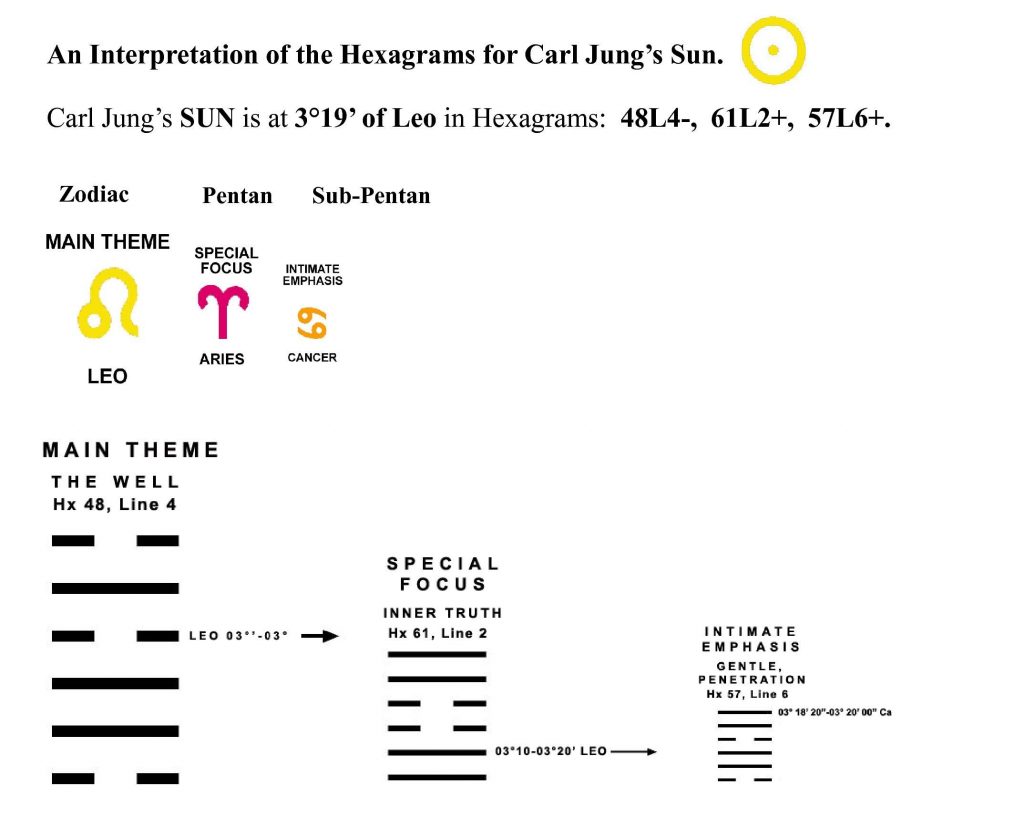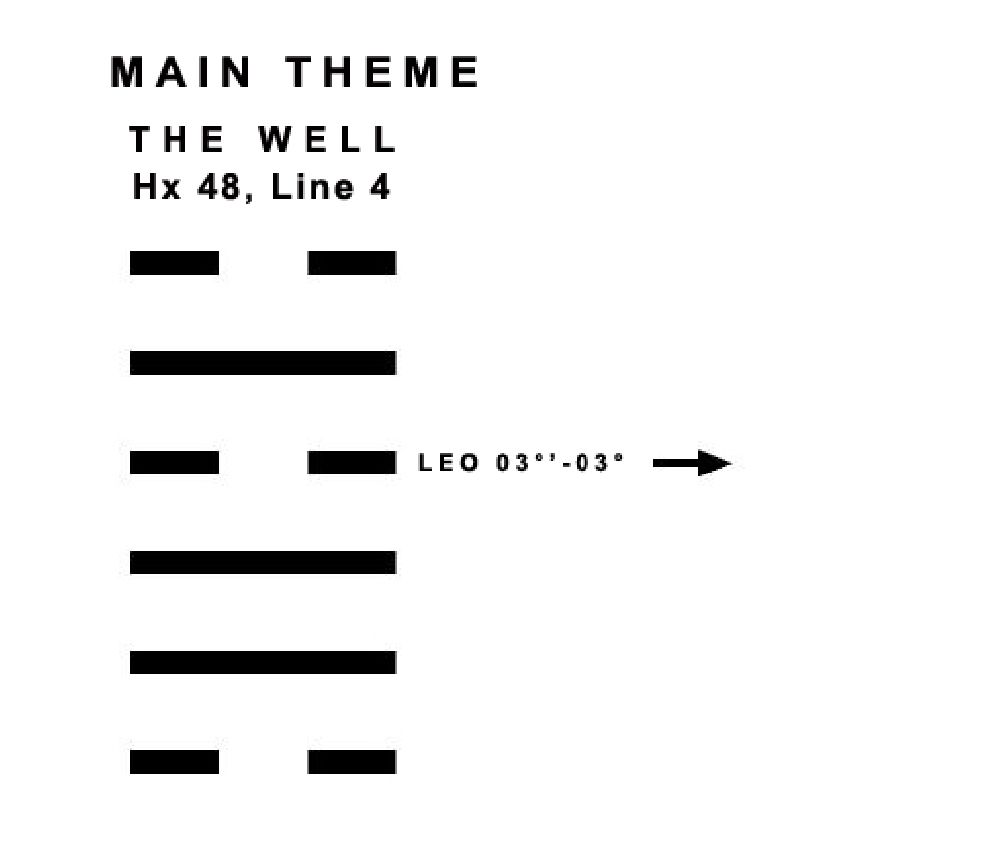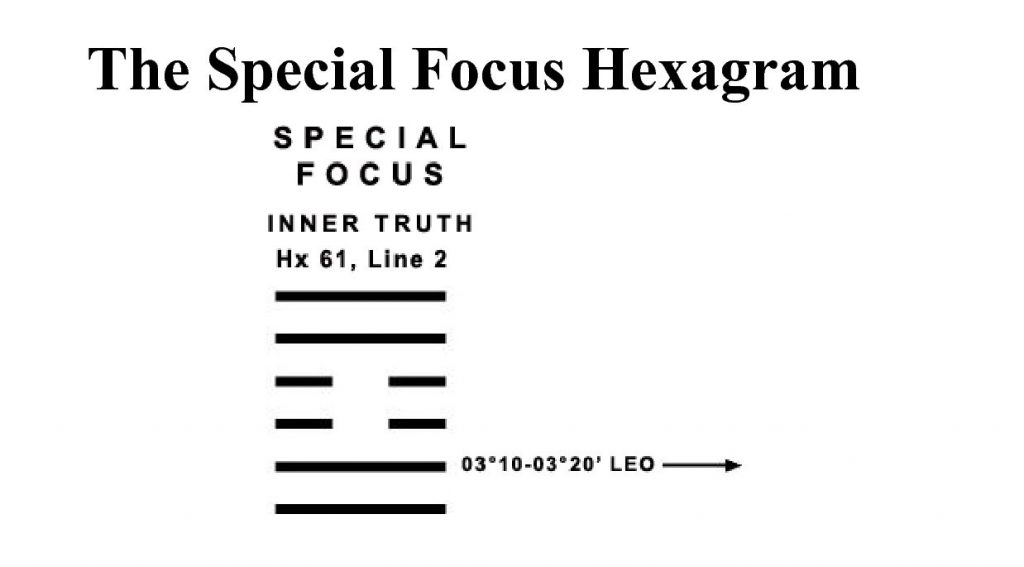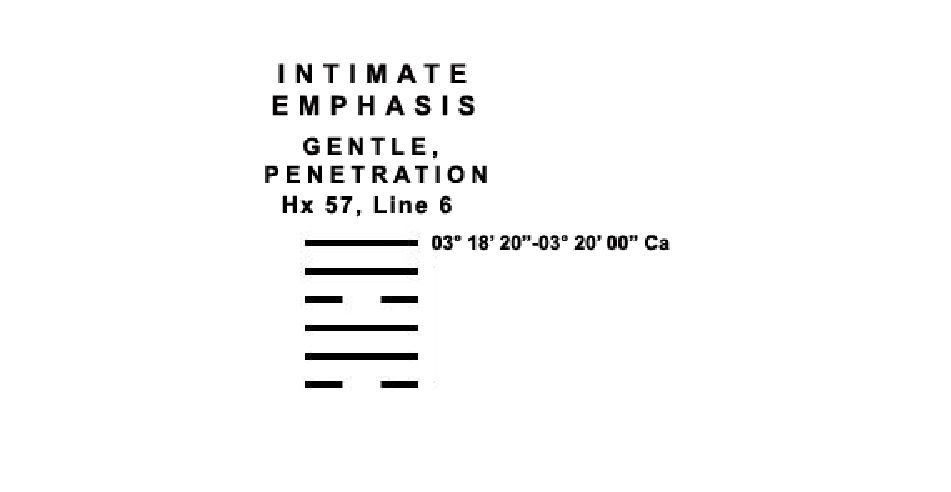Carl Jung’s SUN is at 3°19’ of Leo in Hexagrams: 48L4-, 61L2+, 57L6+.

The Sun represents one’s sense of confidence in life. This often reveals itself as one’s purpose or main goal. Carl Jung’s Sun was in the Zodiac sign of Leo. It indicates that he is a proud and noble person with a strong determination to be the best. He is inclined to lead, to teach and to show others how to do things. Most Leos want to make a name for themselves.
The Main Theme Hexagram

Level 1: Hexagram 48: The Well……. Line 4 – (a broken line).
The Main Theme Hexagram for the Sun reveals the basic challenges involved in finding and maintaining one’s self confidence. Strengths and weaknesses implied in the hexagram are likely to be magnified in their importance. The lessons or directions implied will have a special significance in the expression of one’s purpose. The hexagram’s advice will stand as a puzzle to be solved in the drama of life, a Zen koan of the soul. One’s ability to apply the lessons suggested in a hexagram, consciously or unconsciously, will improve one’s ability to be confident and to succeed. To strive and live an honourable life is the challenge. How well one is able to do this is a good indication of success.
The Main Theme Hexagram for Carl Jung’s Sun is 48, The Well (Line 4). The first category for this hexagram is Above and Below.
ABOVE AND BELOW:
The abyss above, wood below.
Deep water, penetrating wood.
The water is there but the roots may not reach it.
The well is there but it is not in good order.
It will be difficult to drink.
Danger without, gentleness within.
There is work to be done.
Criticism will not help!
The primary implications here are subjective, which only Carl Jung would know. We are left with making some association to his life and its purpose as best we can. The more one knows about his life the better one will be able to do this.
My impressions are as follows:
Jung’s work is a well of depth, filled with water. There are many penetrating insights and much nourishment to be gained. The wisdom is there but not everyone can understand him or accept what he says. (The roots may not reach the water). His approach is somewhat threatening to mainstream psychology and some educational institutions. The institutes are there , but they are not in good order. Not everyone will be able to study Jung’s works at university. (It will be difficult to drink). They may have to line the well of their knowledge with independent efforts.
(Danger without). Jung will encounter adversity and disagreement.
(Gentleness within). His capacity to gently penetrate the depths and line the well of his understanding is an indication of his greatness. He persevered, confident of the work to be done. In spite of criticism, silent determination and the ability to listen allowed Jung to reach the well and repair the lining for those who would follow him.
The second category for The Well is The Image.
THE IMAGE:
To penetrate the depths,
To find light in the darkness,
And to bring joy to the world.
If you want to teach, positive content is important.
Maintenance of the vehicle is critical.
To be discriminating will ensure good fortune.
Set a good example.
If the body gets sick, who will follow it?
Good water, good life!
The idea of the well continues. Penetrating the depths, finding light in the darkness, and acquiring positive content presents a good description of Carl Jung’s work, with the added comment about it bringing joy to the world. Certainly, his insights are refreshing and enlightening. A good example of discrimination is in Jung’s studying with Freud. He listened and understood but could not agree with Freud on certain key issues. There is a difference between discrimination of this kind and the criticism mentioned in the first section. (Good water, good life!) This just seems to be an affirmation of Carl Jung’s work and content.
THE JUDGEMENT
Difficulties without, sensitivities within.
There are problems to be solved.
Words of caution will not suffice.
Talk is cheap.
What is needed can be seen.
To help others furthers.
To help oneself will draw criticism.
The best leaders walk in the rear.
In this way dangers can be seen
And the vulnerable can be helped.
To be content with one’s own self worth,
One must have the welfare of others in one’s heart
And act accordingly.
There is no need for therapy if there are no problems. It takes one who is inwardly sensitive if one is to be trusted to help in personal matters of psyche and consciousness. If one is not sincere, then one’s words will be useless. Jung could see how to help others find the well for themselves. He observed the dangers and guided others in their vulnerabilities. This Judgment nicely summarizes Jung’s approach to life.
The next category is the Family Relationship:
FAMILY RELATIONSHIP:
The first daughter to the second son.
She is sensitive to his problems.
She will offer advice. He will listen.
She penetrates. He withdraws.
She will express what is needed.
He will help if he has to.
The more gentle she is, the more helpful he will be.
She is perceptive. He is critical.
She will be persuasive. He will be discriminating.
She knows the seeds of responsibility.
He feels the weight of obligation.
She will express herself.
He will reflect and analyze the implications.
He assumes there will be opposition.
She will try to persuade him of the benefits.
While this section specifically expresses a particular family relationship, it would be safe to say that the implications of this relationship would prevail in Carl Jung’s life and even in his counseling work. The family relationship expresses wonderfully the implications of the hexagram. Further comment is not needed here.
The next category is Zodiac Considerations (Pentans).
If one places one’s own self importance
Over the needs of others,
And rushes forward,
There will be humiliation.
To reap rewards, one must approach patiently
And give preference to the difficulties of others.
True leaders will take care of themselves last.
This section deals with the sub-category of the Zodiac Sign Leo. The first five lines of The Well are influenced by the pentan Aries, and the sixth line at the top is influenced by Taurus. The implication is that selfish impulse will cause humiliation. The characteristics of approaching patiently and giving preference to the difficulties of others are as good as signatures for Carl Jung’s life and work.
THE LINES:
Carl Jung’s Sun is in Line 4 (between 3 and 4 degrees of Leo).
The line the Sun is in provides a special focus into how the Main Theme energies, mentioned
above, are expressed.
Six in the fourth place: (03° – 04° Leo)
As the sun shines on all.
You must share your insights and resources.
Consider the greater good.
Be patient.
Do not let your own energy degenerate.
The meaning gives more specific advice. To succeed Jung must consider the greater good and share his insights with everyone. He must also be patient in the process. This truly seems to hit the mark. It even leaves room to reflect on the greater good of the collective unconscious.
The fourth place: 03° – 04° Leo: 61. Inner Truth
The well is properly lined.
Actions will speak louder than words.
Fill the stomach and not the mind.
Let the young and the old drink first.
There is a level 2 hexagram that further elaborates each line of the Main Theme hexagram. There are a few lines to represent this influence here. To go deeper one should, in this case, read hexagram 61: Inner Truth.
The emphasis here is on actions more than words. Keep the inner truth within and don’t try to shout it out. Make sure everyone is nourished and secure first. This throws out a challenge about what should be talked about and what should not! Maybe silence should prevail over words?
Line 4: (Six in the fourth place)
The problems are more than one person can handle.
There will be delays.
One joins with others to help.
Good fortune.
It would be important for Jung to make allegiances and align with others.
The next section gives technical consideration as to why the line interpretation was made the way it was.
Technical Considerations of Line 4:
Broken in an even place
Appropriate receptivity
Yielding at the right time
(Astrological note: This place concerns the affairs of Houses 7 and 8)
Holding Together with appropriate energy below.
(Astrological note: Appropriate reinforcement from Houses 5 and 6)
Holding Together with appropriate energy above.
(Astrological note: Appropriate reinforcement from Houses 9 and 10)
No Correspondence
Trigrams of Influence:
Lower Nuclear Upper Nuclear Upper Primary
3rd Daughter 2nd Daughter 2nd Son
Joy The Clinging The Abysmal
Lake Fire Water, Danger
This is a broken line in the fourth (an even) place. It implies appropriate receptivity and yielding at the right time. This seems to describe the manner of Jung’s behaviour and insights. The fourth line refers to the astrological houses of relationships and social values. Again this is an area from which Jung observed many experiences and insights.
Holding Together is a technical term in the I Ching. When a solid line is next to a broken line or vice versa, they are deemed to be Holding Together. In this case Line four is appropriately receptive and holding together with appropriate energy from the line below (Line three). This implies good and righteous support. Line four also holds together with appropriate energy from the line above or Line five.
The astrological notes let us conclude that positive performance and appropriate service will be available for the relationship and its values so that good understanding and a successful outcome can be achieved.
(Note: Traditionally holding together was considered between only certain lines, however with the new balance of freedom and responsibility replacing the ways of the superior man, the holding together is now considered at all levels.)
Correspondence is another technical term that refers to when the bottom line in the upper trigram is the opposite of the bottom line in the lower trigram. The same holds true for the middle lines or upper lines of the trigrams above and below. It implies, in this case that line one is also a broken line so that there is no correspondence or special relationship between these two lines.
The three trigrams influencing this line are The Joyous Lake, The Clinging Fire and The Abysmal Water. The Joyous implies joyous action. The Clinging implies dependency and clarity. The Abysmal implies difficulty or danger. One might simply conclude that Carl Jung found joy in bringing clarity to the dangerous dependencies that cause psychological problems and distress.

This is a broken line in the fourth (an even) place. It implies appropriate receptivity and yielding at the right time. This seems to describe the manner of Jung’s behaviour and insights. The fourth line refers to the astrological houses of relationships and social values. Again this is an area from which Jung observed many experiences and insights.
Holding Together is a technical term in the I Ching. When a solid line is next to a broken line or vice versa, they are deemed to be Holding Together. In this case Line four is appropriately receptive and holding together with appropriate energy from the line below (Line three). This implies good and righteous support. Line four also holds together with appropriate energy from the line above or Line five.
The astrological notes let us conclude that positive performance and appropriate service will be available for the relationship and its values so that good understanding and a successful outcome can be achieved.
(Note: Traditionally holding together was considered between only certain lines, however with the new balance of freedom and responsibility replacing the ways of the superior man, the holding together is now considered at all levels.)
Correspondence is another technical term that refers to when the bottom line in the upper trigram is the opposite of the bottom line in the lower trigram. The same holds true for the middle lines or upper lines of the trigrams above and below. It implies, in this case that line one is also a broken line so that there is no correspondence or special relationship between these two lines.
The three trigrams influencing this line are The Joyous Lake, The Clinging Fire and The Abysmal Water. The Joyous implies joyous action. The Clinging implies dependency and clarity. The Abysmal implies difficulty or danger. One might simply conclude that Carl Jung found joy in bringing clarity to the dangerous dependencies that cause psychological problems and distress.
The Intimate Emphasis Hexagram

Level 3: Hexagram 57: Gentle, Penetration. ….. Line 6 + (a solid line).
The Intimate Emphasis Hexagram is the most personal accentuation. It is because of this personal intimate level that many people easily relate to this level of interpretation.
The Intimate Emphasis Hexagram is The Gentle, The Penetrating, Wind and wood. (Line 6+) It has been Jung’s sensitive and penetrating insights that made his work distinctive. It shows in particular contrast to Freudian assessments. Jung felt that everything could not be based on sexual complexes alone. He felt that the collective unconscious played a much greater part than was accepted by his fellow psychologists.
ABOVE AND BELOW:
The wind above and the wind below.
Wind penetrates through the trees.
The trees will bend in the wind.
Enduring gentleness.
One will have a profound influence.
What one cannot get from the mother,
One will get from the father.
Here we see the source of Jung’s differences with Freud. What one cannot get from the mother one will get from the father. Could it be explained better? Freud was known for the Oedipus complex and sexual roots to complexes, while Jung felt there were other valid interpretations and causes of neuroses. .
THE IMAGE:
A gentle breeze through the trees.
Move around obstructions.
Gentleness penetrates hearts.
Clarity about the happiness of others brings good fortune.
Listen well.
Speak cautiously.
This is a beautiful image to represent Carl Jung and his purpose in life. He could sense whether people were happy or not, and was able to reach them accordingly.
THE JUDGEMENT:
Gentle penetration within and without.
Words of advice.
One repeats oneself for greater effect.
If one is sincere and considerate
And one’s words are well spoken
Even those at a great distance can be influenced.
How much more so for those close at hand?
What one says will be repeated.
Some will sympathize and others may scorn.
It would be wise to reflect before one speaks.
Usually one needs to think twice about what Jung has said in order to fathom the implications. It was his consideration and sincerity that gave a special penetrating quality to his expressions.
FAMILY RELATIONSHIP:
The first daughter to herself.
She is gentle in her manner of influence.
She is sensitive to the demands of the time.
When she asks for something,
It will be difficult to refuse.
She is concerned over security.
Inwardly open, outwardly strong.
She is active everywhere, but is sensitive to those around her.
She senses the seeds of commitment and responsibility.
She increases her influence by helping where it is needed.
She knows what she has to do to get what she wants.
Jung married well and it enabled him the luxury of travel when needed. He also had a tower made, to which he could retreat and spend time alone.
ZODIAC CONSIDERATIONS:
Wind can give and wind can take away.
If nature is kind there will be abundance.
If one is considerate one will accomplish much.
The more one gives,
The more one will get.
If one holds back there will be opposition.
In his writing Jung certainly did not hold back his imagination or his insights. He gave his all!
LINE 6:
Nine in the sixth place: (29° – 30° Cancer)
One wants to rest but cannot.
Too much is at stake.
If one were able to listen one would do better.
One acts when one should not
Someone will be inconvenienced.
Credibility will be diminished
This seems to sum up Jung’s work ethic. He pushed forward as much as he could. There was always more to do.
The sixth place: 29° – 30° Cancer: 13. Fellowship With Men
Surrounded by strong characters
One’s needs will be met.
If one is carried away by the momentum of others
One’s behaviour may be diminished.
Thoughts about his tower where he could retreat and gather himself together come to mind.
Nine in the sixth place:
Wasted words.
One expresses favouritism
And loses credibility.
Self-centred influence will alienate others
And encourage gossip.
Jung was a man of many words, but few would ever say he wasted them. Perhaps he was sensitive to those who would talk without having anything to say. Perhaps these were standards which he avoided.
Technical Considerations of Line 6:
Solid in an even place
Inappropriate action
Firmness at the wrong time
(Astrological note: This place concerns the affairs of Houses 11 and 12)
No Holding Together
No Correspondence
Trigrams of Influence:
Upper Primary

Sub-Pentans
Jung was perhaps very aware of this vulnerability. By having his Sun in the seventh house, he was able to see what other people were capable of, and had an innate sense of timing. Perhaps this implies that he could see when anyone was acting inappropriately?
The use of the I Ching from an astrological or planetary focus proves to be quite an adventure, however it is one with many discoveries and insights along the way. These hexagram interpretations have much stronger personal relevance when studying the planetary positions from one’s own horoscope, than when trying to decipher objective relevance about someone else. No doubt it is easy to see the significance of the words of the I Ching. It can and does provide an affirmation to the individual so searching.
We are using the I Ching here to access its wisdom and apply it to the scheme of our life. This allows for a deeper sense of relationship and implications. It also allows one to go back and reapply this information over one’s life, allow for a long term assimilation of the messages within. By simple divination one may not run into all of the I Ching hexagrams in one’s lifetime, however through astrology it does become a possibility. What is unique here is the new level of application and the depth of insights that arise from determining the hexagrams from a horoscope.
